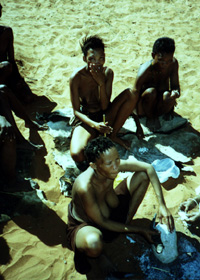
Travelling around the world is not as easy as transport from one place to another. The greatest adventures and memories are when you succeed to build good relationship with other people, but how do you do that?
Lesson learned from famous explorers is about having a positive behaviour, open attitude, be patience and show respect. What you really need is good communication skills to build trust. One great explorer and author is Rudyard Kipling. Here we present three poems written of him. All these poems give a good guidance about what you not should do, and what you should do to establish best friendship with all kind of people.
"If" - A poem about how to live the life and to make other happy:
If
If you can keep your head when all about you
Are losing theirs and blaming it on you,
If you can trust yourself when all men doubt you
But make allowance for their doubting too,
If you can wait and not be tired by waiting,
Or being lied about, don't deal in lies,
Or being hated, don't give way to hating,
And yet don't look too good, nor talk too wise:
If you can dream -- and not make dreams your master,
If you can think -- and not make thoughts your aim;
If you can meet with Triumph and Disaster
And treat those two impostors just the same;
If you can bear to hear the truth you've spoken
Twisted by knaves to make a trap for fools,
Or watch the things you gave your life to, broken,
And stoop and build 'em up with worn-out tools:
If you can make one heap of all your winnings
And risk it all on one turn of pitch-and-toss,
And lose, and start again at your beginnings
And never breath a word about your loss;
If you can force your heart and nerve and sinew
To serve your turn long after they are gone,
And so hold on when is nothing in you
Except the Will which says to them: "Hold on!"
If you can talk with crowds and keep your virtue,
Or walk with kings--nor lose the common touch,
If neither foes nor loving friends can hurt you;
If all men count with you, but none too much,
If you can fill the unforgiving minute
With sixty seconds' worth of distance run,
Yours is the Earth and everything that's in it,
And--which is more--you'll be a Man, my son!
Published 1910
Rudyard Kipling (1865-1936)
Something to think about for they who want to build good relationship with other people:
The White Man's Burden
By Rudyard Kipling
McClure's Magazine 12 (February 1899).
Take up the White Man's burden--
Send forth the best ye breed--
Go, bind your sons to exile
To serve your captives' need;
To wait, in heavy harness,
On fluttered folk and wild--
Your new-caught sullen peoples,
Half devil and half child.
Take up the White Man's burden--
In patience to abide,
To veil the threat of terror
And check the show of pride;
By open speech and simple,
An hundred times made plain,
To seek another's profit
And work another's gain.
Take up the White Man's burden--
The savage wars of peace--
Fill full the mouth of Famine,
And bid the sickness cease;
And when your goal is nearest
(The end for others sought)
Watch sloth and heathen folly
Bring all your hope to nought.
Take up the White Man's burden--
No iron rule of kings,
But toil of serf and sweeper--
The tale of common things.
The ports ye shall not enter,
The roads ye shall not tread,
Go, make them with your living
And mark them with your dead.
Take up the White Man's burden,
And reap his old reward--
The blame of those ye better
The hate of those ye guard--
The cry of hosts ye humour
(Ah, slowly!) toward the light:--
"Why brought ye us from bondage,
Our loved Egyptian night?"
Take up the White Man's burden--
Ye dare not stoop to less--
Nor call too loud on Freedom
To cloak your weariness.
By all ye will or whisper,
By all ye leave or do,
The silent sullen peoples
Shall weigh your God and you.
Take up the White Man's burden!
Have done with childish days--
The lightly-proffered laurel,
The easy ungrudged praise:
Comes now, to search your manhood
Through all the thankless years,
Cold, edged with dear-bought wisdom,
The judgment of your peers.
How to learn about life and other people with asking open questions:
Extract from Rudyard Kipling:
I keep six honest serving-men
(They taught me all I knew);
Their names are What and Why and When
And How and Where and Who.
-- Rudyard Kipling (1865-1936)
Just So Stories (1902); "The Elephant's Child"
-----------------------------------------------
Additional comments by
Stein Morten Lund, 5 July 2000
Travel Explorations
----------------------------------------------
